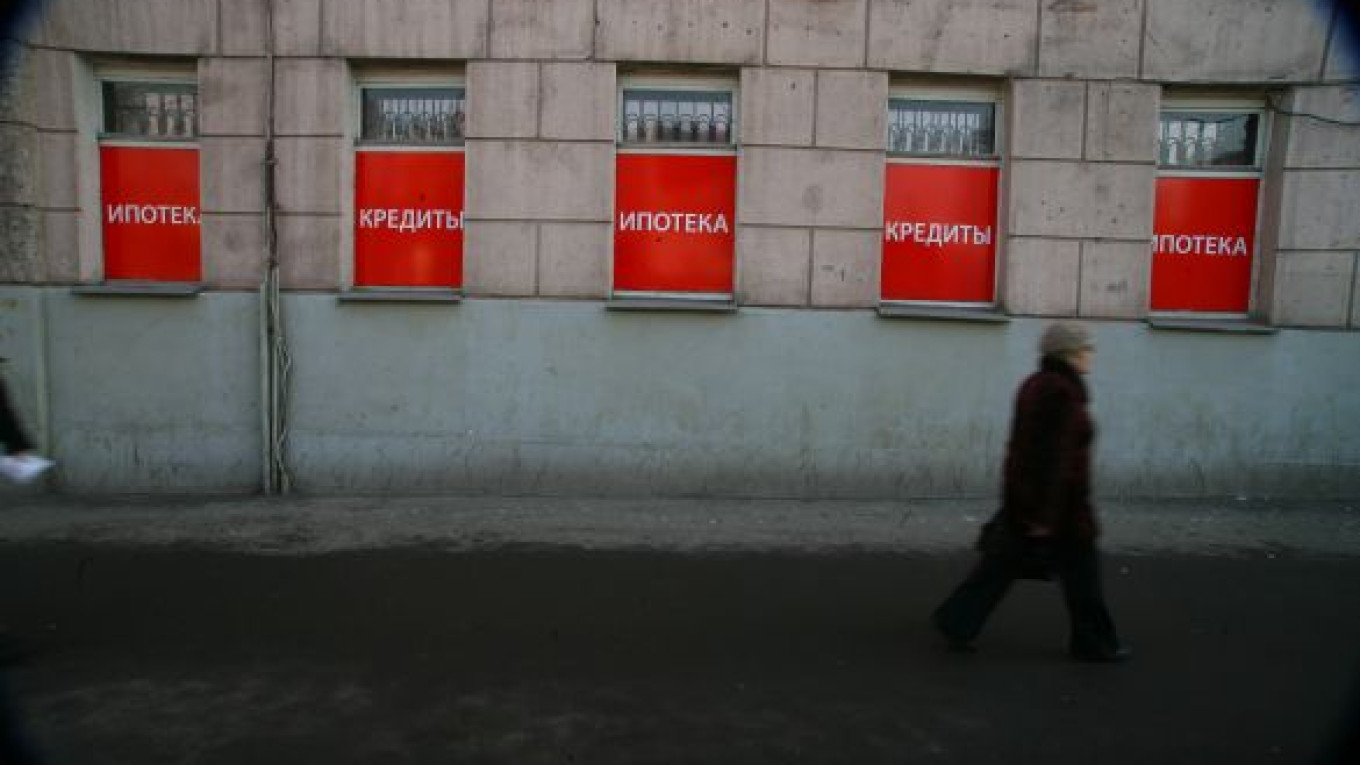The mortgage market showed some signs of recovery in March. Demand for mortgages rose 10 percent, and the number of deals increased 3.7 times from the year earlier.
Demand for mortgage loans rose about 10 percent over the last month and will continue to grow, experts at Ipotek.ru said. The change in demand is not only one of quantity but of quality as well: "Clean" mortgage buyers who are buying apartments, not just trading up, have appeared.
The number of registered mortgage deals for existing homes in Moscow also has demonstrated a positive dynamic compared with last year's indicators. In March 2010, the Moscow branch of the Federal Registration Service registered 1,609 mortgage deals, which is 3.7 times higher than the level in March 2009 and 2.5 percent higher than March 2008, according to Miel's Analytics Center.
Analysts say the bump in mortgage deals is because of demand that was built up during 2009 and just now being realized, as the situation on the real estate market has stabilized and banks are starting to lower interest rates.
Mortgage rates for existing homes fell in ruble terms to an average of 14.6 percent annually, while in dollar and euro terms they are down to 10.8 percent, Miel said in a report.
Sberbank president German Gref said Friday that the bank would lower its interest rates by 0.5 percentage points to 1 percentage point and would stop charging loan fees.
"The rate announced for loans will be the effective, final rate for borrowers," Gref said. Taking into account the absence of fees, loans will become 2.5 percentage points to 3 percentage points cheaper, he said. The lowest mortgage rate will be 10.5 percent, which will be for ruble loans for organizations with pay wages through Sberbank.
By the beginning of this year, rates on certain loans fell to 10 percent. This wasn't the first time in the short history of Russian mortgages that lowering rates to this level was a catalyst for demand, said Dmitry Ovsyannikov, chief executive of Ipotek.ru. Mortgages hit the psychologically important 10 percent mark for the first time in 2004.
"Before 2004, the average rate was above 12 percent to 13 percent, and the share of housing purchases that used mortgages was only 2 percent to 3 percent," Ovsyannikov said. "In 2004, mortgage rates fell to almost 10 percent, after which demand for mortgage loans began to grow geometrically, and by 2007, every fifth apartment was bought with a mortgage."
As for the "psychological barrier," it was surpassed again by the beginning of this spring. Specifically, in the second half of January and February, many people had already received mortgages through the Mortgage Lending Agency at rates of 9 percent to 11 percent. This vivid example led many who traditionally don't trust new instruments to believe that they have a real opportunity to get a loan.
"It's entirely possible that the pace at which rates are falling will lead to rates of 10 percent to 11 percent this year. Already today there are programs with even lower rates," said Alexei Shlenov, chief executive of Miel Brokerage.
These lower rates at least assure us that, if we haven't reached the end of the crisis in the mortgage market, we have passed the bottom, analysts at Ipotek.ru said.
A Message from The Moscow Times:
Dear readers,
We are facing unprecedented challenges. Russia's Prosecutor General's Office has designated The Moscow Times as an "undesirable" organization, criminalizing our work and putting our staff at risk of prosecution. This follows our earlier unjust labeling as a "foreign agent."
These actions are direct attempts to silence independent journalism in Russia. The authorities claim our work "discredits the decisions of the Russian leadership." We see things differently: we strive to provide accurate, unbiased reporting on Russia.
We, the journalists of The Moscow Times, refuse to be silenced. But to continue our work, we need your help.
Your support, no matter how small, makes a world of difference. If you can, please support us monthly starting from just $2. It's quick to set up, and every contribution makes a significant impact.
By supporting The Moscow Times, you're defending open, independent journalism in the face of repression. Thank you for standing with us.
Remind me later.


